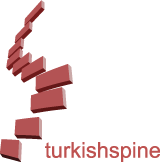ABSTRACT
Object:
Transpedicular fixation technique, by means of anterior or posterior approaches, is known to be a biomechanically stronger method in cervical fracture-dislocation. Pedicle axis views are obtained using fluoroscopy to match the screw entry point with pedicle orientation and to report the clinical results and safety of cervical pedicle screw fixation (CPSF) in patients treated for unstable cervical fracture -dislocation.
Methods:
Post-operative malposition of the transpedicular screws of the 52 pedicles of the 12 patients who have been operated due to trauma were investigated. Fixation was performed between C3 and C7, and iliac wing and lamina were used as autograft for fusion.
Results:
Eight of the cases were male, while four were female. The average age of the patients was 40.9 (34-65). 12 of the cases had trauma; 4 had unilateral, 8 had bilateral fracture dislocation. Five of these were at the C5-C6 segment, four in C6-7 segment, while the other three were at the C6-C7 segment. In the postoperative computed tomography (CT) scans, the applied screw was observed to have directly penetrated into the vertebral foramen in only one (1.9 %) pedicle during the fixation process; however, the blood circulation appeared normal in angiography. In terms of screw-pedicle relations, the screws were at their correct places in 45 pedicles (86.5 %), while non-critical pedicular lateral orientation was detected in 3 (5.7 %), and medial orientation in another 4 pedicles (7.6 %). The cases were followed up for a total of 14 to 31 months (24.7). Solid posterior bone fusion was achieved in all, there is no morbidity or mortality in this series.
Conclusion:
Use of the CPSF provides a very strong three column stabilization but also carries a high risk of vascular injury without nerve damage. Postoperative CT scanning showed major breach in one pedicle (1.9 %) and minor breach in 7 pedicles (13.2 %) of 52 screws that had perforated the pedicle. CPSF can be performed in a one stage posterior procedure without the need of anterior surgery in trauma patients.



